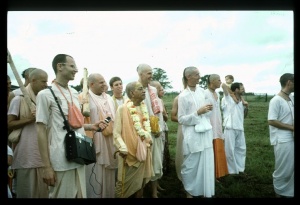CC Madhya 5.45

A.C. Bhaktivedanta Swami Prabhupada
TEXT 45
- tumi yadi kaha,—‘āmi kichui nā jāni’
- tabe āmi nyāya kari’ brāhmaṇere jini”
SYNONYMS
tumi—you; yadi—if; kaha—say; āmi kichui nā jāni—I do not remember anything; tabe—in that case; āmi—I; nyāya kari’—arguing; brāhmaṇere—the younger brāhmaṇa; jini—shall conquer.
TRANSLATION
“If you simply say, ‘I do not remember,’ I shall take care of the rest. By argument, I shall defeat the young brāhmaṇa.”
PURPORT
The son of the elderly brāhmaṇa was an atheist and a follower of the Raghunātha-smṛti. He was very expert in dealing with pounds-shillings-pence, but he was fool number one. Consequently, he did not believe in the spiritual position of the Deity, nor did he have any faith in the Supreme Personality of Godhead. Therefore, as a typical idol worshiper, he considered the form of the Lord to be made of stone or wood. Thus he assured his father that the witness was only a stone Deity and was not capable of speaking. Besides that, he assured his father that the Deity was situated far away and consequently could not come to bear witness. In essence, he was saying, “Have no anxiety. You do not have to lie directly, but you should speak like a diplomat, like King Yudhiṣṭhira when he spoke to Droṇācārya—aśvatthāmā hata iti gajaḥ. Following this principle, simply say that you do not remember anything and are completely unaware of the statements given by the young brāhmaṇa. If you make the background like that, I shall know how to fill in the argument and defeat him by word jugglery. Thus I shall save you from having to give your daughter to him. In this way, our aristocracy will be saved. You have nothing to worry about.”